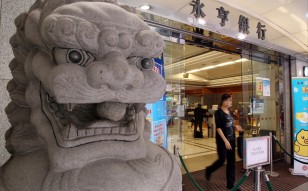Mainland Chinese banks have been expanding aggressively in Hong Kong since about 2000.
Guangzhou Yue Xiu Holdings has made an offer for Chong Hing, Hong Kong’s smallest family-run bank, the latest state-owned Chinese firm to pile into Hong Kong’s already overcrowded banking sector.
Chong Hing’s controlling shareholders have already accepted the offer, made on Friday, and the concerns of Hong Kong’s banking regulator about a firm with no previous banking experience running one of its lenders have already been allayed, according to a person familiar with the deal.
Mainland Chinese banks have been expanding aggressively in the financial hub since about 2000. Six of the top 10 Chinese banks in Hong Kong expanded their balance sheets by double-digit percentage points from 2011 to 2012, according to a recent report by consultancy KPMG.
They are trying to capture increasing demand for cross-border financial services, driven by the internationalisation of the renminbi and Hong Kong’s development as an offshore renminbi centre. Many are also using Hong Kong units as an offshore funding platform and as a stepping stone to further expansion overseas.
Guangzhou Yue Xiu, owned by Guangzhou’s municipal government, had already set up a unit based in Hong Kong, engaged in real estate, transport and securities businesses.
In a statement on Friday, Yue Xiu said it wanted to take advantage of Chong Hing’s financial services licences, customer network, comprehensive portfolio of products and listing status to further develop its financial services platform in Hong Kong and build its market position as an integrated financial service provider in the Pearl River Delta Region.
The incursion by mainland lenders is adding to an already tough position for Hong Kong's banks: net interest margins are at historically low levels and competition for funds is intense.
Hong Kong’s biggest banks - HSBC, Standard Chartered, Hang Seng Bank and Bank of China (Hong Kong) - hold about 53% of Hong Kong citizens’ deposits.
In addition, loan growth is set to slip as mortgage lending slows. The Hong Kong government’s efforts to cool the city’s soaring property prices have slowed the sales of homes. Property transactions in May dropped to 5,288, well below the five-year average of 10,313 between 2008 and 2013.
All this is against a backdrop of increased regulatory scrutiny and rising costs from having to comply with a raft of new rules, most of which are global such as Basel III.
Yue Xiu must have looked a welcome suitor when it offered to buy up to 75% of the bank for HK$35.69 each, or HK$11.64 billion (US$1.5 billion). Each shareholder will also receive a special dividend of HK$4.5195 in cash for every Chong Hing share related to a property sale - Chong Hing will sell its headquarters in Hong Kong to the family's investment firm, Liu Chong Hing Investment.
Despite selling out, the pride of the family which controls Chong Hing may have been saved in part by a clause in the offer which states Chong Hing will maintain its listing on Hong Kong’s stock exchange, despite the expense and trouble to Yue Xiu.
Nomura is advising Yue Xiu and providing finance. UBS advised Chong Hing.
Yue Xiu’s purchase of Chong Hing Bank looks reasonably priced given the competition among banks in Hong Kong, exacerbated by mainland Chinese firms’ expansion across the border.
The sale value at about 2.1 times historical price-to-book is slightly above the average 1.93 multiple paid for Hong Kong-based banks in recent decades, according to analysts at Goldman Sachs.
The deal’s valuation is nonetheless below that of some notable recent transactions, including state-controlled China Merchants Bank’s HK$17 billion purchase of a 46.9% stake in Wing Lung Bank, which changed hands in 2008 at 2.9 times historical book value.
Singapore-based DBS Group bought Dao Heng Bank in 2001 for a price that was 3.3 times its historical book value. This shortfall reflects Hong Kong bank’s falling return on equity in recent years.
As one of Hong Kong’s smaller banks - Chong Hing controls less than 1% of all HK system deposits and loans - its future was looking bleak.
Clearly it was time for Chong Hing’s controlling family to sell out. The owners of Wing Hang Bank, which is reviewing offers, is likely to be next.
-- Finance Asia 2013 October 27










